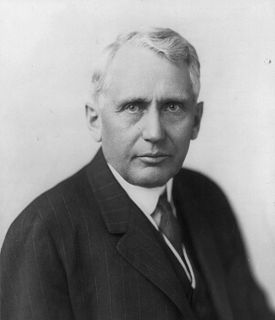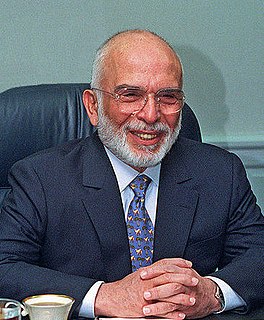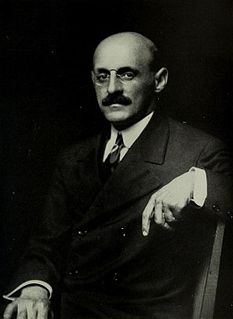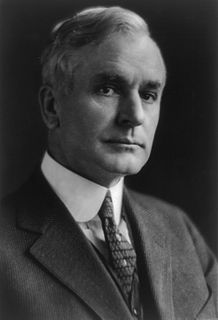A Quote by Calvin Coolidge
It is accordance with our determination to refrain from aggression and build up a sentiment and practice among nations more favorable to peace, that we ratified a treaty for the limitation of naval armaments made in 1921, earnestly sought for a further extension of this principle in 1927, and have secured the consent of fourteen important nations to the negotiation of a treaty condemning recourse to war, renouncing it is an instrument of national policy, and pledging each other to seek no solution of their disagreements except by pacific means.
Quote Topics
Aggression
Among
Build
Condemning
Consent
Determination
Disagreements
Each
Earnestly
Except
Extension
Favorable
Fourteen
Further
Important
Instrument
Limitation
Made
Means
More
National
Nations
Naval
Negotiation
Other
Our
Pacific
Peace
Policy
Practice
Principle
Recourse
Refrain
Secured
Seek
Sentiment
Solution
Sought
Treaty
Up
War
Related Quotes
There is an Arabic proverb which says that "Peace comes from understanding, not agreement." Agreements are more easily broken than made; but understanding never. It is urgent, therefore, and in the interest of peace, that there be better understanding among nations. As people we are one, seeking the same goal. As nations, we lose each other down the different paths we choose to fulfill our national objectives. that is why we must understand each other better.
Is America becoming decadent? Do we no longer regard our promises and pledges as sacred? ... We promised to make peace with Germany only in conjunction with the Allies; but we brought forward a separate peace, demanding for ourselves all the advantages of the Treaty of Versailles but rejecting all the responsibilities embodied in the Treaty. It was America's President who induced Europe to form a League of Nations; and then America was the first country that refused to joint it.... If these are not the symptoms of national decadency, what are they?
The 'nations,' as they are called, with whom our pretended ambassadors, secretaries, presidents, and senators profess to make treaties, are as much myths as our own. On general principles of law and reason, there are no such 'nations.' ... Our pretended treaties, then, being made with no legitimate or bona fide nations, or representatives of nations, and being made, on our part, by persons who have no legitimate authority to act for us, have intrinsically no more validity than a pretended treaty made by the Man in the Moon with the king of the Pleiades.
He (George W. Bush) should depart. He should go away from the presidency and let the Americans lead an ordinary life with other nations, not a life of aggression, a policy of aggression against other nations. This policy has brought about disasters to the U.S. So for the U.S. to live properly with the world and for the world nations to live in peace, this crazy man should go.
More than 180 countries around the world have ratified CEDAW, some with reservations. While the United States signed the treaty in 1981, it is one of the few countries that have not yet ratified it. As a global leader for human rights and equality, I believe our country should adopt this resolution and ratify the CEDAW treaty.
The goal of liberalism is the peaceful cooperation of all men. It aims at peace among nations too. When there is private ownership of the means of production everywhere and when laws, the tribunals and the administration treat foreigners and citizens on equal terms, it is of little importance where a country's frontiers are drawn... War no longer pays; there is no motive for aggression... All nations can coexist peacefully.
To attain peace among the nations in any dynamic or enduring form requires not simply political negotiation but a new mode of consciousness. The magnitude of this change is in the order of religious conversion or of spiritual rebirth rather than of treaty processes or even of inter-cultural understanding. Simply to recognize the basic nature and dimension of the issues we face is already an advance.
The new naval treaty permits the United States to spend a billion dollars on warships-a sum greater than has been accumulated by all our endowed institutions of learning in their entire history. Unintelligence could go no further! ... In Great Britain, the situation is similar. ... Until the figures are reversed, ... nations deceive themselves as to what they care about most.
Our policy is to give all possible material aid to the nations that still resist aggression across the Atlantic and Pacific Oceans. And we make it abundantly clear that we intend to commit none of the fatal errors of appeasement. We have the thought that in this nation of many states we have found the way in which men of many racial origins may live together in peace. If the human race as a whole is to survive, the world must find a way by which men and nations may live together in peace. We cannot accept the doctrine that war must be forever a part of man's destiny.
I am firmly convinced that in the world of today all nations will be forced to the conclusion that cooperation for law, justice, and peace is the only alternative to a constant race in armaments-including atomic armaments-and to other disruptive practices that will bring the nations participating in them on either side to a common ruin, the equivalent of universal suicide.






























